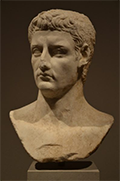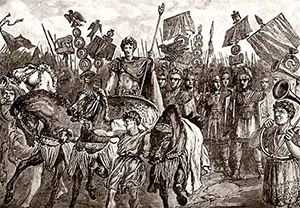Claudius: Roman Emperor, Conqueror of Britain
Claudius was the fourth Emperor of Rome. He ruled for more than a decade and is perhaps most well-known for overseeing the Roman conquest of Britain. 
He was born Claudius Nero Germanicus on Aug. 1, 10 B.C., in Lugdunum, in Gaul. His father, Drusus, died on the battlefield when young Claudius was just 1 year old. Antonia, Claudius's mother, reared the boy and his two older siblings, Germanicus and Livilla, on her own. His uncle Tiberius succeeded Augustus as emperor in 14; Claudius's appeals to be included in government fell on deaf ears. He had no better luck in 37, when Claudius's nephew Caligula succeeded Tiberius on the throne. (After Germanicus had died, in 19, Tiberius had adopted Caligula.) Claudius limped, had a speech impediment, and was often ill; as a result, he spent almost his entire childhood in seclusion. He was a good student and a devoted scholar; some sources say that he could read the Etruscan language, which didn't survive much after Rome absorbed that culture. He also wrote a handful of books, including a few histories, such as an eight-volume treatment of the history of Carthage. One of his teachers was the famous historian and writer Livy. His family didn't consider him emperor material. However, he got his chance after Caligula was assassinated. Members of the Praetorian Guard found Claudius cowering behind a curtain and proclaimed him as emperor. Two days later, the Senate agreed. From being the butt of jokes for most of his life–including four years of never-ending cruelty at the hands of his nephew– he had ascended to the height of power. Claudius didn't get along all that well with the Senate, many of whom distrusted him. However, he gained favor with the Senate and with the people for executing the people who killed Caligula. He restored fiscal responsibility to the royal treasury, in stark contrast to his wild-spending predecessor. He ordered new building projects, including roads, canals, and aqueducts. He proved a good administrator and personally oversaw fundamental changes in the imperial bureaucracy. A keen interest in law compelled him to preside at public trials. All of these things convinced the Senate and the people to respect him, to a certain extent. He still had his enemies and his detractors. 
For a variety of reasons, and despite his lack of military training, Claudius ordered the might of Rome to be unleashed on Britain. He ordered an expedition of conquest, sending 40,000 troops and several war elephants to Britain. Roman legions were very successful there, conquering what is now England and Wales and some of what is now Scotland. Claudius arrived to preside over the capture of Colchester, then returned to Rome to announce his victory. He was in Britain all of 16 days, but Britain was conquered (and would stay Roman for a few centuries). Claudius had four wives in all and six children, two of whom were adopted. Claudius had his wife Messalina executed for plotting against him and then married Agrippina the Younger. His new wife persuaded him to adopt Domitius as his son. He took the name Nero. Claudius died on Oct. 13, 54. Many sources say that he was poisoned; suspicion fell on his last wife and his successor, Nero.
|
|
Social Studies for Kids
copyright 2002–2026
David White




